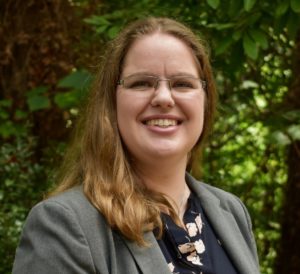1. Tell us a little bit about yourself. Where are you from?
I’m a PhD candidate in Political Science. I was actually born in Atlanta, but my family moved to the Seattle area when I was a kid, so I tend to think of Washington as home/where I’m from even if that’s not entirely accurate.
2. What’s your favorite book?
Honestly, it’s very difficult for me to pick a favorite book. If I had to pick, my all-time favorite would probably have to be Pride and Prejudice — I reread it frequently! That said, I set a goal of reading more this year and some of my recent favorites (that I highly recommend) are The Guernsey Literary and Potato Peel Pie Society, The Alice Network, and the Maisie Dobbs series.
3. What’s your favorite thing about Emory/Atlanta?
One of my favorite things about Atlanta is how each neighborhood has its own unique vibe. I feel like whatever your preference, there is neighborhood for you in or around Atlanta (even for someone like me who doesn’t usually think of myself as a “big city person”). My favorite thing about Emory is definitely the people! I have made amazing friends at Emory and have had incredible mentors and advisors — these relationships have really been the highlight of my time at Emory.
4. What are you researching for your dissertation?
For my dissertation I’m researching electoral reform, or changes to electoral rules. My dissertation is three papers that all explore some aspect of electoral reform. In the first, I use a survey experiment focusing on redistricting in the United States to better understand how citizens balance potentially competing preferences for partisan gain versus fairness and how elite-level polarization affects this tradeoff. In the second, I use survey data from the United Kingdom to explore how experience with multiple electoral systems (which is actually quite common around the world as different rules are often used for elections at different levels of government) affects support for electoral reform at the national level. In the third, I use an electoral reform from the 1880s in the United Kingdom to better understand the conditions under which rank-and-file legislators will support electoral reform (especially when they think it might cost them their seat in a future election).
5. What interested you about the Woodruff Library Fellowship?
I was interested in the Woodruff Library Fellowships originally because I had a vague idea that they would allow me to use my skills while contributing to something bigger than myself. But it was talking to some of the subject librarians at one of the info sessions that got me really excited about the Research and Engagement Fellowship in particular. I love that it gives me an opportunity to do so many different things — help analyze and manage collections, help with consultations and instruction sessions, and generally learn so much about how the library works. My vague sense that I could contribute to something bigger than myself and help others has turned out to be accurate and those are the things that I love the most about this opportunity!
6. What will you be working on this year for your Woodruff Library Fellowship?
This fall, I’m working with the collection management team on collection analysis (and I’m loving it). Right now, we are working on collecting and analyzing data to evaluate various journal packages to which Emory subscribes. I’m finding it very eye-opening in terms of learning what goes into ensuring students and faculty have access to the materials they need, but it’s also a fun and interesting new data science challenge for me. In the spring, I expect this work will continue and expand to other journal packages and other collections, but I think I will also be helping more with instruction and consultation and I’m looking forward to getting involved with that.

